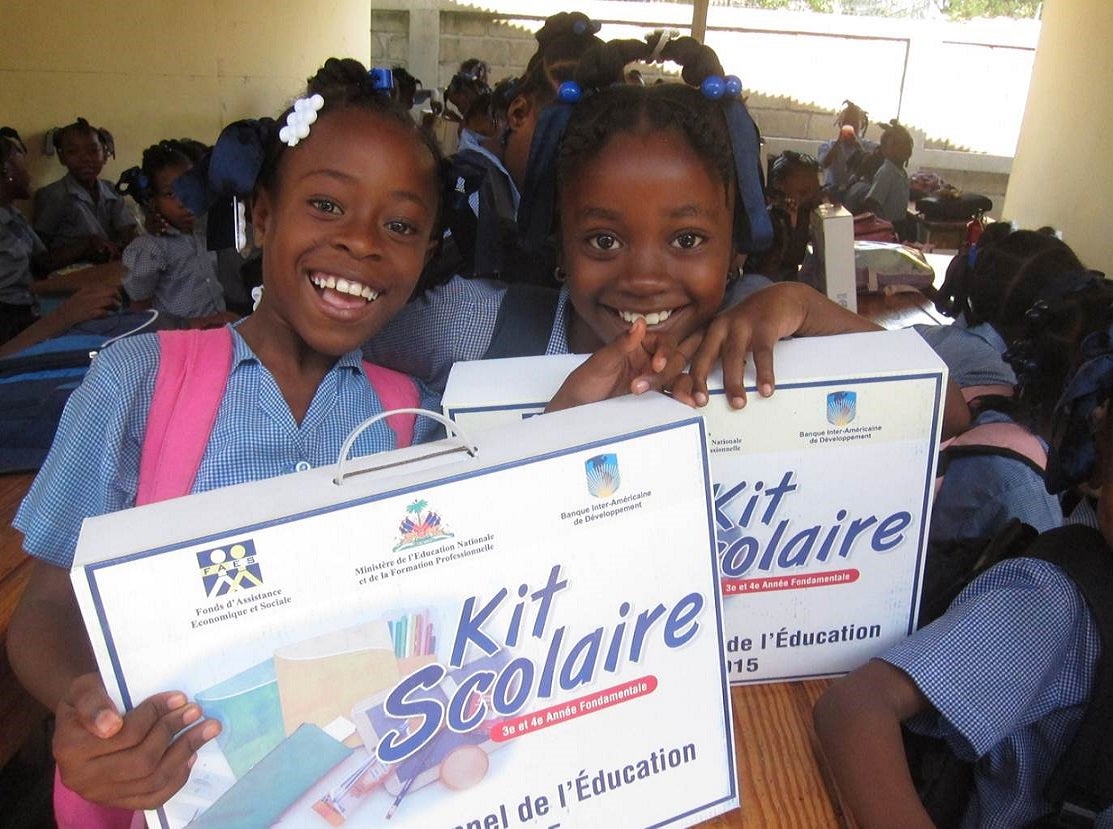by Katherina Hruskovec*
“Working in Haiti is very challenging because change cannot happen as quickly as we wish, especially after the earthquake. However, the real joy comes from winning small victories,” admits Education Specialist Anouk Ewald. Although she uses the word “small”, her work as part of the Inter-American Development Bank’s delegation in Haiti has benefited thousands of children and youth in the past four years.
 A clear example of these activities is school construction. As a result of the disaster in 2010, 4268 schools were completely destroyed. To immediately confront this reality, the IDB supported the government, during the emergency stage, in building provisional education structures to meet the urgent needs. In the consecutive reconstruction phase, the Bank also plans to build at least 80 schools.
A clear example of these activities is school construction. As a result of the disaster in 2010, 4268 schools were completely destroyed. To immediately confront this reality, the IDB supported the government, during the emergency stage, in building provisional education structures to meet the urgent needs. In the consecutive reconstruction phase, the Bank also plans to build at least 80 schools.
Anouk highlights four other projects as key elements of the IDB’s work since the earthquake: the establishment of technical and vocational training centers, in-service teacher training, school censuses, and the delivery of school kits. For Anouk, these projects show the Bank’s commitment to education quality in Haiti.
“The school censuses have been extremely important because they allow the government to know how many students are currently in the system and provides information and data that can then be used in decision-making processes,” Anouk explains. She then adds that, starting in 2011, the government executed annual censuses for three consecutive school years.
According to Anouk, the establishment of technical and vocational training centers is another government priority that the IDB supports. Five centers have been built and equipped to train 400-600 youth every year, with more to come in the next 2 years. In total, almost 10,000 youth, over 200 trainers, center directors and ministry staff have benefitted. These vocational skills have proven to be very valuable, especially in an economy that is fundamentally informal and that greatly lacks strong technical capacities. The IDB has also been collaborating, and continues to do so, with the Ministry of Education in providing in-service training to 495 teachers to improve education quality.
 Finally, the distribution of school kits was an important milestone in IDB’s support to Haiti between 2012 and 2013. “It was very rewarding to see the smiles of the children when they received the school kits,” recalls Anouk. The delivered packages included two uniforms, four books, and classroom material, such as a backpack, notebooks, and pencils. “Although these are very basic kits, they made a big difference for kids, because they help improve their classroom experience,” continues Anouk. School kits currently benefit approximately 103,000 students ranging from kindergarten to sixth grade.
Finally, the distribution of school kits was an important milestone in IDB’s support to Haiti between 2012 and 2013. “It was very rewarding to see the smiles of the children when they received the school kits,” recalls Anouk. The delivered packages included two uniforms, four books, and classroom material, such as a backpack, notebooks, and pencils. “Although these are very basic kits, they made a big difference for kids, because they help improve their classroom experience,” continues Anouk. School kits currently benefit approximately 103,000 students ranging from kindergarten to sixth grade.
“It is those moments, those small victories, that encourage you to keep going and help you realize that you are doing the right thing with your life,” Anouk further adds.
After majoring in early childhood education, Anouk obtained a degree in International Education Development, which ultimately allowed her to join the IDB in Haiti, her native country, as an education specialist. “I returned to Haiti after having lived in the United States for 13 years. My father had always told me that everything I had accomplished in life, I owed to Haiti. Because of that, I knew I would have to return to my country what it had given to me. So, when the IDB provided me the opportunity to help, I took it”, says Anouk with a smile on her face.
* Katherina Hruskovec is a communications consultant for the Education Divison of the Inter-American Development Bank.



Leave a Reply